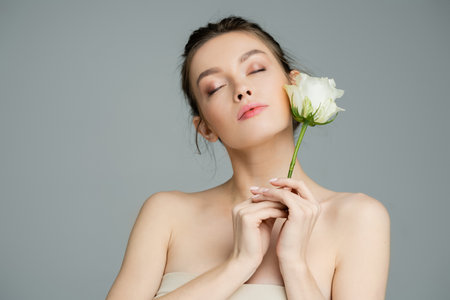1. Understanding Skin Changes in Your 30s
Your 30s are a turning point when it comes to skincare. While your skin may still look youthful, subtle changes start to happen beneath the surface — and they can affect how your skin looks and feels. Knowing what’s going on during this decade can help you choose whether a natural or clinical skincare approach is best for you.
What Happens to Your Skin in Your 30s?
As you move into your 30s, your body’s natural processes begin to slow down. This includes cell turnover, collagen production, and oil regulation. You might notice that your skin isnt as radiant as it used to be, or that fine lines are beginning to show up around your eyes and mouth.
Key Skin Changes in Your 30s
| Skin Change | Description | Impact |
|---|---|---|
| Slower Cell Turnover | Your skin renews itself less frequently than it did in your 20s. | Dullness, uneven tone, rough texture |
| Decreased Collagen Production | Collagen levels drop about 1% per year after age 30. | Fine lines, loss of firmness |
| Dryness & Dehydration | Skin may produce less oil and retain less moisture. | Tighter feel, increased sensitivity, flakiness |
| Sun Damage Accumulates | Pigmentation and dark spots become more noticeable. | Uneven skin tone, early signs of aging |
| Hormonal Changes | Fluctuations can lead to adult acne or melasma. | Breakouts, discoloration |
Why Preventative Skincare Matters Now
Your 30s are the perfect time to shift from just treating breakouts or dryness to actively preventing future damage. The earlier you start protecting your skin against aging factors like sun exposure, pollution, and stress, the better results you’ll see long-term. Whether you go the natural route with botanical ingredients or opt for clinical treatments backed by science, understanding your skin’s changing needs is the first step toward building an effective routine.
Tip:
A gentle exfoliant (like lactic acid or fruit enzymes) can help combat dullness caused by slower cell turnover — just be sure not to overdo it if you have sensitive skin.
Coming Up Next:
We’ll dive into the core differences between natural and clinical skincare approaches so you can decide what works best for your lifestyle and skin goals.
2. What Defines Natural Skincare?
When it comes to choosing skincare in your 30s, the term “natural” gets thrown around a lot — but what does it really mean? In the U.S., natural skincare typically refers to products made with ingredients that come from nature, like plants, minerals, and other naturally occurring sources. However, its important to know that the term “natural” isnt strictly regulated by the FDA, so labels can sometimes be misleading.
Key Characteristics of Natural Skincare
While theres no official legal definition, here are some common features that help define natural skincare products:
| Feature | Description |
|---|---|
| Botanical Ingredients | Derived from plants such as aloe vera, chamomile, green tea, or jojoba oil. |
| No Synthetic Fragrances or Dyes | Avoids artificial scents and colorants which may irritate sensitive skin. |
| No Harsh Chemicals | Tends to skip sulfates, parabens, phthalates, and petrochemicals. |
| Cruelty-Free | No animal testing involved in product development or production. |
| Sustainable Packaging | Packs products in recyclable, biodegradable, or reusable containers. |
The Rise of Clean Beauty in the U.S.
“Clean beauty” has become a buzzword among health-conscious consumers in their 30s who are starting to pay more attention to what they put on their skin. While similar to natural skincare, clean beauty focuses on safety and transparency. A product labeled as “clean” might still include synthetic ingredients — but only ones proven safe for human health and free from controversial chemicals.
The Appeal for Women in Their 30s
Your 30s is a time when skin starts to show early signs of aging like fine lines and uneven tone. Many people turn to natural or clean skincare because they want gentle yet effective options that won’t disrupt their skin’s balance. Plus, with growing awareness about environmental sustainability and ingredient safety, shoppers are looking beyond just results — they want products that align with their values too.
A Lifestyle Choice as Much as a Skincare One
Navigating natural skincare is not just about ingredients; its about making intentional choices that support your health and the planet. Whether its using an organic rosehip oil or buying from brands with eco-friendly missions, these decisions reflect a deeper commitment to wellness — something that resonates strongly with many Americans entering this new phase of life.

3. Clinical Skincare: Science-Backed Solutions
When you hit your 30s, your skin starts to show early signs of aging—fine lines, uneven tone, and a bit of dullness. That’s where clinical skincare steps in with real results backed by science. These products are often developed by dermatologists and contain potent active ingredients that go beyond what over-the-counter or all-natural options can offer.
Why Choose Clinical Skincare?
Clinical-grade skincare is designed to target specific skin concerns with precision. The formulas are usually created through scientific research and often include ingredients that have been tested and approved by the FDA. This means youre not just hoping for results—you’re using products that are proven to work.
Key Benefits of Clinical Skincare
| Benefit | What It Means for Your Skin |
|---|---|
| Dermatologist-Developed Formulas | Created by skin experts who understand the science behind aging, acne, and other concerns. |
| Higher Concentrations of Active Ingredients | Ingredients like retinol, peptides, or AHAs are present in effective amounts that deliver visible results. |
| FDA-Tested Claims | You can trust the claims on the label because they’ve gone through regulatory testing for safety and effectiveness. |
Popular Clinical Ingredients in Your 30s
- Retinol: Helps reduce fine lines and boost collagen production.
- Vitamin C: Brightens the skin and fades dark spots.
- Niacinamide: Calms redness, improves texture, and strengthens your skin barrier.
- Hyaluronic Acid: Provides deep hydration to keep skin plump and smooth.
If youre ready to tackle early signs of aging head-on or manage adult acne more effectively, clinical skincare could be a game-changer. While these products may come at a higher price point, their concentrated ingredients and research-backed performance make them worth considering as part of your 30s skincare routine.
4. Natural vs. Clinical: Key Differences at a Glance
When youre in your 30s, skincare becomes less about trends and more about finding what truly works for your skin. As you explore options, youll likely come across two main categories: natural skincare and clinical (or medical-grade) skincare. Both have their pros and cons, and understanding the key differences can help you make smarter choices for your routine.
Ingredient Sourcing
Natural skincare products typically use plant-based ingredients like botanical oils, extracts, and minerals. These are often sustainably sourced and appeal to those who prefer an eco-conscious lifestyle.
Clinical skincare, on the other hand, relies on scientifically formulated ingredients—often synthetic or lab-derived—to deliver targeted results. These might include peptides, retinoids, or stabilized vitamin C.
Effectiveness
This is where clinical skincare usually shines. Thanks to higher concentrations of active ingredients and rigorous testing, clinical formulas often produce faster and more noticeable results—especially when tackling concerns like fine lines, pigmentation, or acne.
Natural skincare may take longer to show effects but can be gentler on sensitive skin types. Its ideal for those looking for maintenance rather than correction.
Safety Standards
Both types of skincare must meet FDA guidelines for over-the-counter cosmetics in the U.S., but clinical brands often go a step further by conducting clinical trials and dermatological testing.
Natural brands may emphasize non-toxic, cruelty-free, or organic certifications. However, “natural” isnt always synonymous with “safe,” especially if you have allergies or sensitivities to essential oils or botanicals.
Brand Transparency
Transparency varies across both categories. Many natural brands highlight their ingredient lists, sourcing practices, and sustainability efforts right on their packaging or websites.
Clinical brands tend to focus on science-backed claims, publishing research data or before-and-after photos to support their formulations. If transparency is important to you, look for brands that openly share third-party testing results and full ingredient disclosures.
Quick Comparison Table
| Category | Ingredient Sourcing | Effectiveness | Safety Standards | Brand Transparency |
|---|---|---|---|---|
| Natural Skincare | Plant-based & eco-friendly | Mild & gradual results | Cruelty-free & non-toxic claims | Sustainability & clean labeling focused |
| Clinical Skincare | Synthetic & lab-formulated actives | Fast & targeted results | Derm-tested & clinically validated | Science-backed with data sharing |
No matter which path you lean toward—natural or clinical—the most important thing is choosing products that align with your skins needs and your personal values. In your 30s, consistency and quality really do make all the difference.
5. How to Pick the Right Regimen for Your Needs
Now that you’re in your 30s, your skincare routine needs to work smarter—not just harder. Whether youre leaning towards natural products, clinical formulas, or a mix of both, the best approach is one that fits your skins needs and your lifestyle. Heres how to figure out what works best for you.
Assess Your Skin Concerns
Your 30s are when early signs of aging often start to show—think fine lines, uneven tone, dryness, or pigmentation. To choose the right regimen, start by identifying your top skin concerns. Here’s a quick guide:
| Concern | Natural Approach | Clinical Approach |
|---|---|---|
| Fine Lines & Wrinkles | Rosehip oil, bakuchiol (plant-based retinol alternative) | Retinoids, peptides |
| Dryness | Aloe vera, hyaluronic acid from botanical sources | Ceramides, synthetic hyaluronic acid |
| Pigmentation / Dark Spots | Vitamin C from natural sources like Kakadu plum | Hydroquinone, medical-grade Vitamin C serums |
Consider Your Lifestyle
Your daily habits matter more than you think. If you prefer minimal routines and clean beauty products, a natural regimen may suit you better. If youre always on-the-go and want fast results backed by science, clinical skincare might be the way to go.
Lifestyle Matching Tips:
- The Minimalist: Choose multi-tasking natural products like facial oils with antioxidants.
- The Skincare Enthusiast: Layer active clinical ingredients strategically for targeted results.
- The Busy Bee: Stick with simplified clinical-grade essentials: cleanser, serum, moisturizer, SPF.
Your Personal Values Matter Too
Sustainability? Cruelty-free? Dermatologist-tested? These factors can influence your decision just as much as ingredients do. Heres how personal values align with skincare paths:
| If You Value… | You Might Prefer… |
|---|---|
| Sustainability & Eco-Friendly Packaging | Natural or Indie Beauty Brands |
| Cruelty-Free & Vegan Formulas | Mainly Natural but Some Clinical Options Too |
| Proven Results & Fast Action | Clinical-Grade Skincare Products |
The Best of Both Worlds: A Hybrid Approach
You don’t have to choose one side forever. Many people in their 30s find success mixing natural and clinical products. For example: use a natural cleanser and toner in the morning for gentle care, then switch to a retinol-based serum at night for anti-aging benefits.
The key is balance—listen to your skin and make adjustments as needed. The perfect skincare path is the one that works for you.


